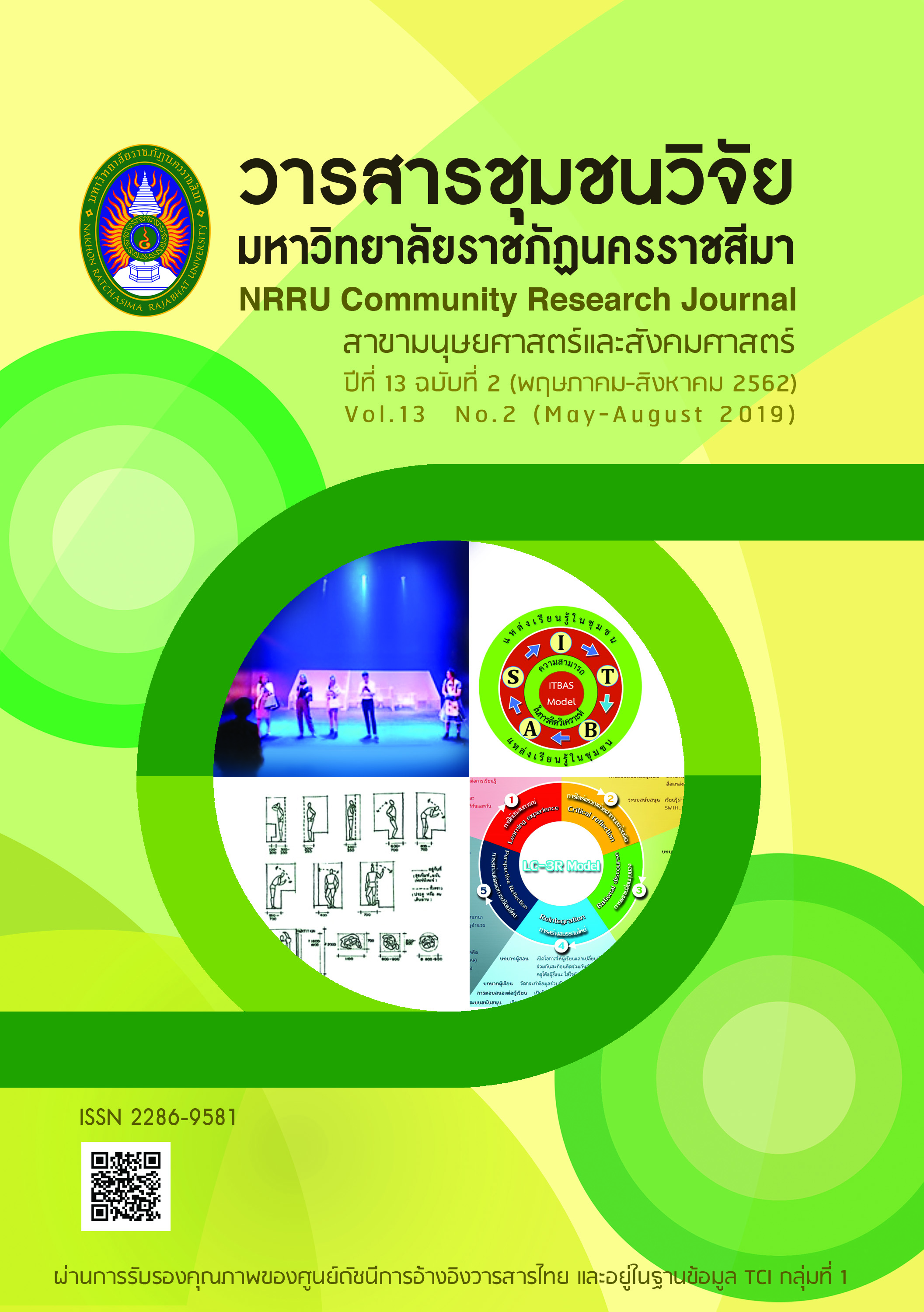กระบวนการพัฒนาความเข้มแข็งของสภาพลเมือง
DOI:
https://doi.org/10.14456/10.14456/nrru-rdi.2019.30คำสำคัญ:
กระบวนการ, การพัฒนาความเข้มแข็ง, สภาพลเมืองบทคัดย่อ
การวิจัย กระบวนการพัฒนาความเข้มแข็งของสภาพลเมือง มีวัตถุประสงค์ 1) เพื่อศึกษาโครงสร้าง อำนาจ บทบาทและรูปแบบการมีส่วนร่วมในการขับเคลื่อนกิจกรรมของสภาพลเมือง 2) เพื่อศึกษาปัญหาและอุปสรรคในการขับเคลื่อนสภาพลเมือง และ 3) เพื่อเสนอแนะแนวทางการสร้างความเข้มแข็งของประชาธิปไตยโดยสภาพลเมือง โดยการทำวิจัยเชิงคุณภาพ โดยใช้วิธีสัมภาษณ์เชิงลึกกับผู้ให้ข้อมูลสำคัญ จำนวน 20 คน เก็บรวบรวมข้อมูลโดยใช้แบบสัมภาษณ์แบบมีโครงสร้างซึ่งผ่านการพิจารณาจากอาจารย์ที่ปรึกษาและผู้ทรงคุณวุฒิแล้ว และวิเคราะห์ข้อมูลโดยการสรุปความรวบยอดอย่างมีเหตุผล
ผลการวิจัย พบว่า โครงสร้าง อำนาจ บทบาทและรูปแบบการมีส่วนร่วมในการขับเคลื่อนกิจกรรมของสภาพลเมือง เป็นดังนี้ 1) รูปแบบธรรมชาติ คือ จังหวัดขอนแก่น 2) รูปแบบโครงสร้างชัดเจน คือ จังหวัดนครราชสีมา และ 3) รูปแบบผสมผสาน คือ จังหวัดอำนาจเจริญ โดยมีข้อเสนอแนะแนวทางการพัฒนาจากปัญหาและอุปสรรคที่พบในประเด็น ด้านคน จะต้องเป็นประชาชนที่ผ่านการขัดเกลาสู่การเป็นพลเมือง ด้านโครงสร้างสภาพลเมือง ควรมีโครงสร้างแบบยืดหยุ่นไม่เป็นแบบทางการ ด้านงบประมาณ ควรมีงบประมาณเฉพาะให้กับสภาพลเมือง ด้านการจัดการ/กิจกรรม/แผนงาน จำเป็นต้องมีการกำหนดทิศทางในการขับเคลื่อนกิจกรรมของสภาพลเมือง ด้านกฎหมาย จำเป็นต้องมีกฎหมายรองรับ ให้อำนาจหน้าที่และบทบาทของสภาพลเมือง และด้านอื่น ๆ เช่น การพัฒนาด้านเทคโนโลยีข้อมูลข่าวสาร การสร้างวัฒนธรรมความเป็นพลเมือง การพัฒนาเครือข่ายประชาสังคม
References
Cohen, J. M., & Uphoff, N. T. (1977). Rural development participation : Concepts and measures for project design, implementation and evaluation. New York : The Rural.
Della Porta, D. (2013). Can Democracy be saved?: participation, deliberation and social movements. John Wiley & Sons.
Jensantikul, N. (2013). Social structure, role and public policy with the citizenship. Journal of Liberal Arts Prince of Songkla University, 49-62. (In Thai)
Piti, S. (2013). Formation of Local Government Model in Thailand: A Case Study of the Participation of Community Organization Council in Local Government Administration. A Thesis for Master of courses forensics degree of Faculty of law, National Institute of development administration, Bangkok. (In Thai)
Political Development Council. (2016). Citizens of mechanisms to strengthen political citizenship. Bangkok : Office of Political Development Council King Prajadhipok's Institute. (In Thai)
Putnam, R. D., Leonardi, R., & Naneti, R. Y. (1994). Making Democracy Work : Civic Traditional in Modern Italy. Princeton University press.
Sales, A. (1991). The private, the public and civil society: Social realms and power structures. International Political Science Review, 12(4), 295-312.
Serirangsan, T., & Issarachai, Y. (2012). Full research reports assess the Council's political development. Bangkok : Office of the Ombudsman. (In Thai)
Starkey, P. (1997). Networking for Development. London : International Forum for Rural Transport and Development (IFRTD).
Tantisunthon, T. (2015). Civic education for Thai society. Bangkok : Institute of policy studies. (In Thai)
The Constitution of the Kingdom of Thailand. (2017). Government Gazette, 134(40a). (In Thai)
Udompong, L. (2015). Education for citizenship in promoting the role of the citizen in a representative political system: the sustainable experience from abroad. Bangkok : Office of research and development King Prajadhipok's Institute. (In Thai)



